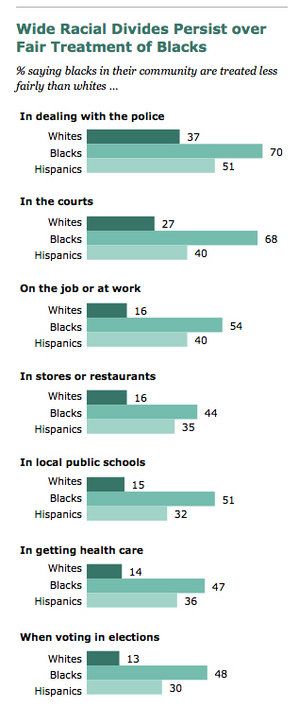King’s dream: Are whites or blacks treated more fairly?

Now that’s a very broad question, so let’s narrow it down and consider specific areas and institutions: police, courts, workplaces, stores and restaurants, local public schools, healthcare, and voting in elections. Would you say that blacks are treated as fairly as whites in each of these?
Researchers at the Pew Research Center asked these questions in a survey earlier this month, timed to coincide with the 50th anniversary. In each area or institution, there are wide racial divides in opinions about fair treatment.
For example, 70 percent of blacks say that blacks in their communities are treated less fairly than whites in dealing with the police, compared to just over a third of whites (37 percent) who say the same. Almost the same proportion of blacks (68percent) says that, in the courts, blacks are treated less fairly than whites, with only 27percent of whites saying the same.
How about treatment in the workplace? Over half of blacks (54 percent) say that blacks in their communities are treated less fairly than whites. Only 16percent of whites agree. Similarly, 44percent of blacks say that blacks in their communities are treated less fairly than whites in stores and restaurants, with only 16 percent of whites agreeing with them.
Generally, we see roughly the same amount of disagreement about fair treatment of blacks in local public schools, healthcare, and voting in elections. Blacks tend to see unfairness. Whites tend to see fairness.
Are you surprised by these racial differences in opinion about fair treatment?
How would you answer the question of fair treatment of blacks, compared to whites, in your community?
Originally published on OurValues.org.
Wayne Baker is a sociologist on the faculty of the University of Michigan Ross School of Business. Baker blogs daily at Our Values and can be reached at ourvaluesproject@gmail.com or on Facebook.


Comments
Billy
Wed, Aug 28, 2013 : 12:21 p.m.
I commend the writer of this piece of using the word "blacks" and not "african-american" which is a horrible misnomer, as not all people of dark skin color and ethnic African features were born in Africa....in fact MOST in this country were not. There's a reason whites don't think blacks are treated unfairly.....because the MAJORITY of them aren't racist bigots, and therefore have never even experienced or witnessed discrimination on EITHER side. Now...as a black person, what are you going to remember in your life experiences? The multitude of non-racist interactions you've had over your lifetime? On the few biting examples that still stand out in your mind, and still raise your blood when you remember them? I have a couple fiery memories of being assaulted (separate incidents, many years apart) by black individuals...and one time was INDEED because of my skin color. I have MANY MANY MANY MANY other positive memories of interactions with black individuals, however they don't "stand out" in my memories like the negative ones do. But I can realize this, and not allow the stronger memories to control my decisions. Logic prevails or at I'm attempting to allow it to. Also...regarding these statistics...I have a feeling that economic station was ALSO a factor in these results. I would actually be curious to know who thinks blacks are treated unfairly MORE.....low income whites, or high income whites? Same for low income and high income blacks....would the higher income blacks be less inclined to say there is a bias in the workplace, at home, while shopping? Really.....economic status is VERY important in these kind of studies.